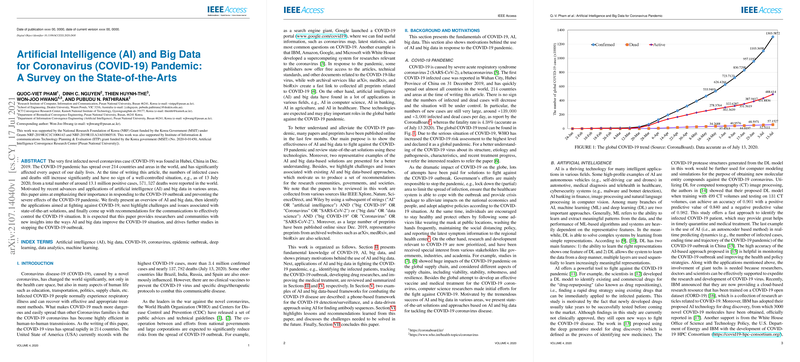AI and Big Data in the Context of COVID-19: A Comprehensive Survey
The paper "AI and Big Data for Coronavirus (COVID-19) Pandemic: A Survey on the State-of-the-Arts," authored by Quoc-Viet Pham et al., provides an exhaustive review of the intersection between artificial intelligence, big data, and their applications in response to the COVID-19 pandemic. It offers insights into how these technologies are being harnessed to combat the challenges posed by the global health crisis.
The primary motivation behind the research is the widespread impact of the COVID-19 pandemic globally, leading to a significant demand for innovative technological solutions to mitigate its effects. The authors aim to underscore the pivotal role AI and big data play in this worldwide effort and highlight the variety of applications these technologies have been employed in—from diagnostics to outbreak prediction and drug discovery.
Overview and Applications
The paper segments the discussion into specific applications of AI and big data in managing the COVID-19 crisis:
- Detection and Diagnosis: AI, particularly machine learning and deep learning methodologies, have been instrumental in diagnosing COVID-19 through medical imaging. The convolutional neural networks (CNN) employed for analyzing chest X-rays and CT scans exhibit impressive accuracy rates, often surpassing traditional methods, thereby enabling quicker and efficient diagnosis.
- Tracking and Predicting Outbreaks: Advanced AI models such as modified SIR models and LSTM networks have been adapted for better accuracy in predicting outbreak sizes and transmission dynamics. These models help forecast the progression of COVID-19 under various scenarios and inform policy initiatives to control the spread.
- Infodemiology and Infoveillance: AI techniques are applied to analyze social media trends and internet activity to understand public perception and misinformation dynamics. This provides insights into public behavior trends and assists in developing effective communication and public health strategies.
- Biomedicine and Pharmacotherapy: The paper reports on AI-driven initiatives towards drug discovery and repurposing, showing promise in identifying potential therapeutic agents against COVID-19. AI algorithms contribute significantly to virtual screening processes, saving crucial time in drug development.
- Big Data Applications: Besides AI, the role of big data is emphasized in outbreak prediction, spread tracking, and other public health applications. With capabilities to handle vast quantities of data from diverse sources, big data analytics offer powerful tools for policy makers and health care providers to respond efficiently to the pandemic.
Key Findings and Implications
The paper highlights the critical contributions of AI and big data in modeling predictions, improving diagnostics, and accelerating research efforts on vaccines and therapeutics, thereby enhancing the global response to the COVID-19 pandemic. Notably, machine learning models like deep neural networks and ensemble learning approaches have demonstrated robustness and efficiency in varied contexts.
Conclusions and Future Directions
The authors conclude with recommendations for overcoming existing challenges such as data privacy, regulation, and the need for standardized datasets to improve AI model performance. They propose integrated frameworks utilizing emerging technologies—like blockchain and federated learning—to enhance data security and model robustness.
Looking ahead, the continued advancement and integration of AI and big data technologies, supported by global collaborations, are likely to remain pivotal in addressing not only the current COVID-19 crisis but also future pandemics. The paper serves as a comprehensive resource for researchers and policymakers aiming to leverage these technologies in healthcare and beyond.
